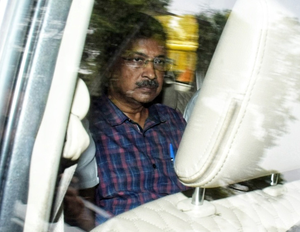New Delhi, May 8 (IANS) With the Supreme Court on Friday granting Delhi Chief Minister Arvind Kejriwal interim bail till June 1, the spotlight is back on the AAP supremo’s eventful journey in the excise policy case — from not complying with multiple ED summons, his arrest ahead of the Lok Sabha elections, to his eventual imprisonment at Tihar Jail.
As per Friday’s court order, the Aam Aadmi Party (AAP) supremo — who was arrested by the Enforcement Directorate (ED) on March 21 in the alleged Delhi liquor policy scam — will have to surrender before the Tihar Jail authorities by June 2. The final round of the seven-phase Lok Sabha elections is scheduled for June 1, while the results will be out on June 4.
Before arresting the AAP national convenor, the ED had first moved a magisterial court twice over his non-compliance with the agency’s summonses in connection with the case. However, the court later granted him bail after issuing a summons to Kejriwal.
Post this, when Kejriwal moved the Delhi High Court seeking “no coercive action” by the agency, the court refused to grant him interim protection.
Before his arrest by the ED on the evening of March 21, the Chief Minister was questioned at his official residence for over two hours. The next day, he was sent to ED custody for six days.
The ED has called Kejriwal the kingpin and key conspirator of the alleged excise policy scam, in collusion with AAP ministers and leaders in Delhi and other persons, alleging that he was involved in the conspiracy of formulating the 2021-22 Excise Policy to favour certain persons, besides demanding kickbacks from liquor businessmen in exchange of favours.
Talking about the proceeds of crime, the probe agency alleged that Kejriwal was involved in the “use of proceeds of crime thus generated in the Goa election campaign of AAP to which he is the convenor and the ultimate decision maker”.
The ED also claimed that the proceeds of crime to the tune of Rs 45 crore, which was part of the ‘bribes’ received from the ‘South Group’, were used by the AAP for its campaign for the 2021-22 Assembly elections in Goa.
One of the main allegations is that AAP was the major beneficiary of the proceeds of crime generated in the alleged Delhi liquor scam.
Though the legality of the Chief Minister’s arrest remains debated, the high court refused to grant any interim relief to him on March 27.
On March 28, before the court extended his ED custody, it let him make personal submissions briefly.
During his submission, the Chief Minister claimed that the CBI filed 31,000 pages while the ED filed 25,000 pages in the case, but no court has found him guilty.
“My question is why have I been arrested,” he had said.
“I am not opposing the ED custody, they can keep me for as long as they want, but this is a scam. My name was taken by four witnesses… People come to my house and speak to me, but is that enough to arrest a sitting Chief Minister,” Kejriwal argued, further contending that people are being turned approver in the case and forced to change their statements.
Special Judge Kaveri Baweja of the Rouse Avenue Court, who is overseeing the excise policy case, sent CM Kejriwal to judicial custody for the first time on April 1.
The high court on April 9 dismissed Kejriwal’s petition challenging his arrest by the ED, and the trial court order remanding him to the agency’s custody, noting that the ED had enough material which had led them to arrest him.
Meanwhile, in the Supreme Court, Kejriwal had filed a counter affidavit in response to the ED submissions, wherein the probe agency claimed that over 170 mobile phones were changed/destroyed by the accused and others during the period of the alleged excise policy scam.
In his affidavit, Kejriwal refuted the ED’s claims of evidence destruction, saying there is no proof to support such allegations against him.
The AAP supremo also condemned his arrest as “politically motivated”, arguing that it unfairly gave an advantage to the ruling party (BJP) during the ongoing elections, compromising the principle of “free and fair polls”.
Meanwhile, while granting Kejriwal interim bail on Friday, the top court directed the Delhi Chief Minister not to visit his office or the secretariat, among other riders.
In its order, the court said that Kejriwal will not sign official files unless it is required and necessary for obtaining clearance/approval of the Lieutenant Governor of Delhi.
It also said that the grant of interim relief should not be treated as an expression of opinion on the merits of the case or the criminal appeal which is pending before the Supreme Court.
–IANS
spr/arm
